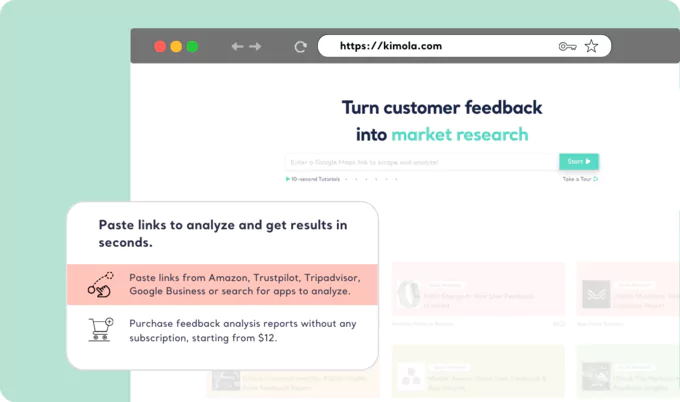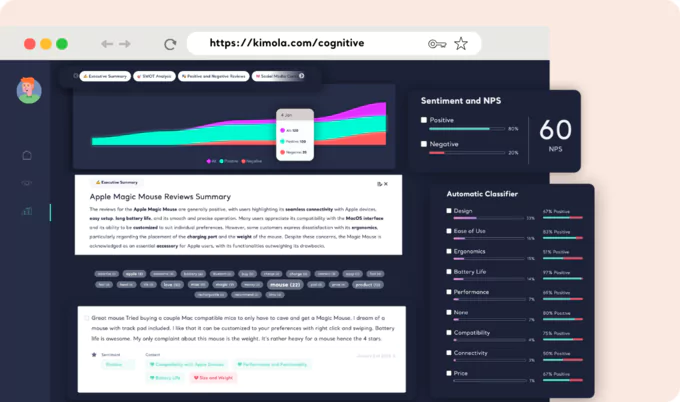-
How can qualitative researchers benefit from analyzing customer feedback with Kimola Cognitive?
Qualitative researchers can leverage Kimola Cognitive to deeply analyze customer feedbac, scrape reviews from 30+ channels, using features like multi-label classification. This facilitates a nuanced understanding of open-ended survey responses and reviews, allowing researchers to generate insights, executive summaries, and review summaries that are both rich in detail and high in accuracy.
-
What makes Kimola.com an ideal tool for scraping and analyzing reviews across multiple platforms?
Kimola offers quick analyzers for popular websites such as Trustpilot, TripAdvisor, Google Business, App Store, and Play Store. By simply pasting links from these websites into Kimola, qualitative researchers can efficiently scrape data with one click, view classified reviews, filter information by sentiment or popular topics, and export the analysis in Excel or PDF formats. This capability accelerates the research process significantly.
-
How does Kimola Cognitive's user-friendly interface aid in the analysis of customer feedback?
With its simple drag-and-drop functionality, Kimola Cognitive enables qualitative researchers to analyze millions of customer feedback contained within spreadsheets effortlessly. This includes open-ended survey responses and conversational data such as agent-customer interactions, providing instant insights without the need for complex setup or training.
-
Can qualitative researchers generate interpretations with GPT technology using Kimola Cognitive?
Yes, qualitative researchers can use Kimola Cognitive's integration with GPT technology to generate interpretations including executive summaries, positive and negative review summaries, and lists of insights. This integration with OpenAI streamlines the creation of detailed reports from customer feedback, enhancing the research output with valuable data-driven findings.
-
How does multi-label classification enhance the analysis for qualitative research?
Multi-label classification allows qualitative researchers to categorize feedback into multiple categories simultaneously, providing a layered understanding of customer sentiments and behaviors. This capability is crucial for uncovering complex patterns and drawing richer insights from textual data without simplifying or losing valuable information.
-
In what ways does sentiment analysis assist qualitative researchers in their analysis process?
Sentiment analysis helps qualitative researchers to filter and classify the emotional tone of customer feedback, whether it be positive, negative, or neutral. This ability to gauge sentiment at a granular level enriches the qualitative analysis by highlighting key areas of customer satisfaction or dissatisfaction for further exploration.
-
How does Kimola Cognitive support qualitative research in multiple languages?
Kimola Cognitive supports feedback analysis in 30+ languages, enabling qualitative researchers to conduct inclusive studies across diverse linguistic groups. This multilingual capability ensures that researchers can gather global insights without beinglimited by language barriers, allowing for a more comprehensive understanding of customer experiences and sentiments worldwide. Qualitative researchers can upload a spreadsheet that contain multiple languages and analyze them swiftly within the same report.
-
What advantages does Kimola Cognitive offer for scraping reviews from a wide range of websites?
Kimola Cognitive's ability to scrape reviews from 30+ websites provides qualitative researchers with an expansive source of customer feedback. This breadth of coverage enables researchers to gather diverse perspectives and compare sentiments across different platforms, enriching their qualitative analysis with varied and comprehensive data.
-
How does the ability to analyze NPS Calculation benefit qualitative researchers using Kimola Cognitive?
While NPS (Net Promoter Score) Calculation is typically associated with quantitative analysis, it can also provide valuable insights for qualitative researchers. By understanding the overall sentiment towards a product or service quantitatively, qualitative researchers can then delve deeper into the reasons behind specific scores, bridging the gap between numerical data and narrative feedback for a holistic analysis. Kimola Cognitive offers filters to view NPS for different departments on the dashboard.
-
How can qualitative researchers sign up for Kimola Cognitive to start analyzing customer feedback?
Qualitative researchers interested in utilizing the powerful features of Kimola Cognitive for their research can easily sign up by visiting Kimola Cognitive page. The process is designed to be straightforward, offering immediate access to the tool's capabilities, including auto-classification without training, sentiment analysis, and the ability to analyze feedback in multiple languages, among others. By signing up, researchers gain access to a comprehensive suite of tools tailored to enhance the depth and breadth of qualitative research. By leveraging Kimola Cognitive's advanced analysis capabilities, qualitative researchers can transform vast volumes of textual data into actionable insights, enhancing their understanding of customer sentiments, needs, and preferences. This in-depth analysis supports informed decision-making and strategy development for businesses and organizations across various sectors.





































